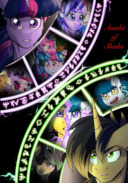Review of "Pancakes" by Petrichord · 3:22pm Jan 17th, 2022
My first review will be on the story Pancakes, by Petrichord!

Being a short story, please note that there will be spoilers. You may skip to the stance on the final verdict which has minimal spoilers. Otherwise, you are advised to read the story first before jumping into the review.
Summary
For the past few weeks, Princess Celestia has been quite used to Daybreaker tempting her in her dreams. Unfortunately for Daybreaker, Celestia doesn't have much use for even greater power or the terrified fealty of others, and even threatening Celestia doesn't seem to perturb the princess in the slightest.
But Celestia wasn't prepared for a dream about making conversation over pancakes with Daybreaker. And she certainly wasn't expecting the loud-mouthed and melodramatic alicorn to be horrifyingly effective at crushing her will with breakfast and cold, twisted logic.
Content/Flow
I believe the story has done a good job in what it sought out to communicate. In my opinion, it sought to show many things; how the demonic temptation of self-harm can rear its ugly head in moments to prove that your mind is stronger than your body, or to punish yourself for something wrong you had done previously; how your own needs are minimally as valuable, or necessary, as others you care are; and how friends can help to claw you out of this degrading cycle, should you be trapped, wallowing in your own guilt, or defying your own needs to prove a point to yourself.
My discussion hitherto however discusses only what the story had intended to communicate from my perspective, but why does the story do an excellent job in showcasing these points, and proffering these morals? I posit that the first reason would be how the author shows how relatable and perhaps common dreaming was when Celestia was sleeping; observe the following excerpt.
...a small, desolate planetoid (last Sunday), the middle of a blazing inferno (the Friday before that), or even the wreckage of Ponyville (the first Tuesday of this month)...
Some readers might dismiss these told facts as unnecessary, or even irrelevant to the story, but I argue that these help draw attention to the similarities between Celestia’s experiences in dreaming and the readers’ own experience. The randomness of each dream described shows how unexpected our dreams can be.
On the other hand, the descriptions of when the dream occurred in parenthesis showcase how common and spontaneous these dreams were to Celestia. In the same way we cannot predict what our dreams are before we sleep, we can see that there is no real pattern of when Celestia had dreamt of Daybreaker. As a result, through this, the author is able to build a relation between Celestia and the reader by showing how relatable Celestia’s experience in dreaming was.
This conveniently leads into my second point, which involves the setting selected for this story, namely Celestia’s dream realm. Dreams are strange images that occur when the mind is trying to link events into cogent chunks for memory retention, leading to extrapolations of these events. As the mind attempts to process this information, it could showcase inner wants or afterthoughts derived from the day’s events.
More precisely, it shows how this morbid temptation was present in the deepest depths of Celestia’s mind. Extending from this, there was still some aspect of evil, or vice, trapped deep within her soul, even though she did not agree with its philosophy. Again, it builds a connection between the reader and Celestia, in how there is somehow always a devil within us, waiting for an appropriate opportunity to pounce. Let’s face it; no individual would be wholly perfect, or wholly good; even Celestia, who was one of the strongest rulers of the land, was vulnerable to her inner, corrupted self.
This manifests in the form of Daybreaker. The story does not get points for how Daybreaker was modelled because it was conceptualised in the show, but it does deserve credit for how Daybreaker was portrayed in this context, in her attempts to corrupt Celestia.
Notice how creative Daybreaker was in trying to warp Celestia’s thoughts by attacking from multiple angles, rather than repeating one idea over and over again to Celestia; Daybreaker was wise to try to probe for weaknesses in Celestia. For instance, Daybreaker tried to use reverse psychology to goad Celestia into falling into her trap of malnourishment. When that did not explicitly work, Daybreaker attempted to use obfuscating fallacies involving false positives, correlation and causation to tempt Celestia in.
But that does not mean that Celestia would bow down to her arguments so easily. I appreciated the dialogue between the two; Celestia was shown to be capable in holding her ground with logical reasoning. The punchy, nuanced and even confrontational dialogue would keep the reader interested in how this would all play out.
These abstract concepts were woven into a surprisingly banal breakfast food: pancakes. Notwithstanding the link they had in “A Royal Problem”, the choice of pancakes to portray these ideas was amazing. The author had managed to attach a different axiological meaning to the pancakes beyond how Luna had taken them for granted in canon. The author managed to add another dimension to that development by conveying how the pancakes provide sustenance on the physiological level. In this sense, it was an internal conflict between satisfying the heart’s desire to go against whatever Daybreaker had in mind and the body’s desire for nourishment. Daybreaker also spelt it out explicitly for her:
“Denying the needs of your body? Or denying the needs of your heart? Either way. You know as well as I do that you won’t resist forever. Either you’ll wither to a lifeless husk without enough strength to push a plate, or...”
Interestingly, this concept of sustenance is driven further with how Celestia herself was portrayed in her own dream; she dreamt that she was physically starved. I would add to that, proffering that her past memories were coming back to haunt her in her dream. She was also starved of her sister’s lack of appreciation or recognition of what she had done for Luna everyday in making those pancakes.
When Celestia was so close to giving into her alter ego’s twisted reality, Luna abruptly barged in to support her sister. (To be fair, it is justified because the subject of attention was on Celestia’s dilemma with her alternate self, rather than the environment around her to notice Luna’s entry.) Here I seek to highlight that it seems like Celestia (and correspondingly, Daybreaker) was more eloquent than Luna, though I had expected the contrary. Perhaps the duo sounded more sophisticated when they were trying to undermine each other’s arguments, but I opine that Luna’s tone was less formal than usual.
Another concern would be how the physical confrontation between Luna and Daybreaker was conveyed in the story. To illustrate this point, I have quoted an excerpt below.
Daybreaker sat up as a tendril of her magic effortlessly parried another lance of blue light. Her eyelids narrowed a fraction of an inch, and Daybreaker’s tendril doubled, then redoubled in size. Faster than Luna could blink, the tendril lashed out and caught her squarely in the face. Celestia gasped as the force of the blow lifted Luna off of her hooves and sent her spinning into a marble column with a meaty thud.
Although the fight sequence is not a major factor in the development of the plot, I believe that it could have been done better to accentuate the tense, confrontational dialogue the duo had earlier. There was a disparity in the punchiness and pithiness of the dialogue’s execution, relative to the more convoluted development of the choreographed action sequences.
To make a few quick points on this subject, this discussion will begin with the longer sentences present in the excerpt above. This would slow reading comprehension down to interpret more clauses. This would inherently slow the pacing of the action, which would weaken its strength and impact on the scene.
Word economy could also be better; “Faster than Luna could blink”, for example, could be done away by simply paragraphing and jumping straight into the action. It would be a sharper way by highlighting the contrast and shift in the character’s actions.
Lastly, the word choice can be improved. Notice the last sentence of the excerpt — words such as “lifted” and “spinning” are relatively weak, compared to, say, “thrown” or “slamming” respectively.
Regardless, Luna’s cry to remind Celestia of her strength to overcome her temptation for self-harm was done well. It was not conveyed as a given, but it took both of them to piece their ideas and thoughts together to uncover the lessons they ought to learn from this experience.
Observe how they had held onto each other for support along the way; for Luna, she was disappointed in herself, in how she was unable to defend her sister from a being she was supposed to have control over; for Celestia, it was how she had nearly bowed down to her evil doppelganger, just over pancakes. These issues did not simply fade away when Daybreaker disappeared, but they had to be resolved following her departure through a serious conversation between them.
This story shows how siblings can support each other through a crisis through their affection and attachment to each other, in spite of what they have gone through. Widening this discussion’s scope, I believe that this could be extended to friends as well. Ultimately, this story does justice to conveying these morals without being preachy, for it had quantifiable and a justifiable meaning to it.
Language
I struggle to find any significant grammatical errors in the piece, and most discrepancies are purposeful, except…
Daybreaker’s tendril of power lashed out again, lifting Luna bodily into the air and bashing her into the ground, over and over again..
Otherwise, I liked how the author had taken advantage of paragraphing to build a lengthy pause to draw attention to the prose in question and emphasise its salience. An example is presented below.
Feigning serenity, Celestia stuck the entire pancake in her mouth and chewed.
It was
Delicious
Stance
Pancakes is a thought-provoking read that I highly recommend. The author took full advantage of the relationship between Daybreaker and Celestia in the context of Celestia’s own dream realm. Even though Celestia’s dreams may be intangible, the author shows us how its effects on her and her sister have tangible, real-world implications on their relationship and their mindsets. It gave the story conflict and Celestia tangible stake in the matter outside of the dream realm, making her emotions and thought processes undeniably relatable.
Content/Plot: 7.5/10
Flow/Communication: 8/10
Language: 8/10
Overall: 7.8/10
Verdict: Highly Recommended






Great. Now I want pancakes.
🥞